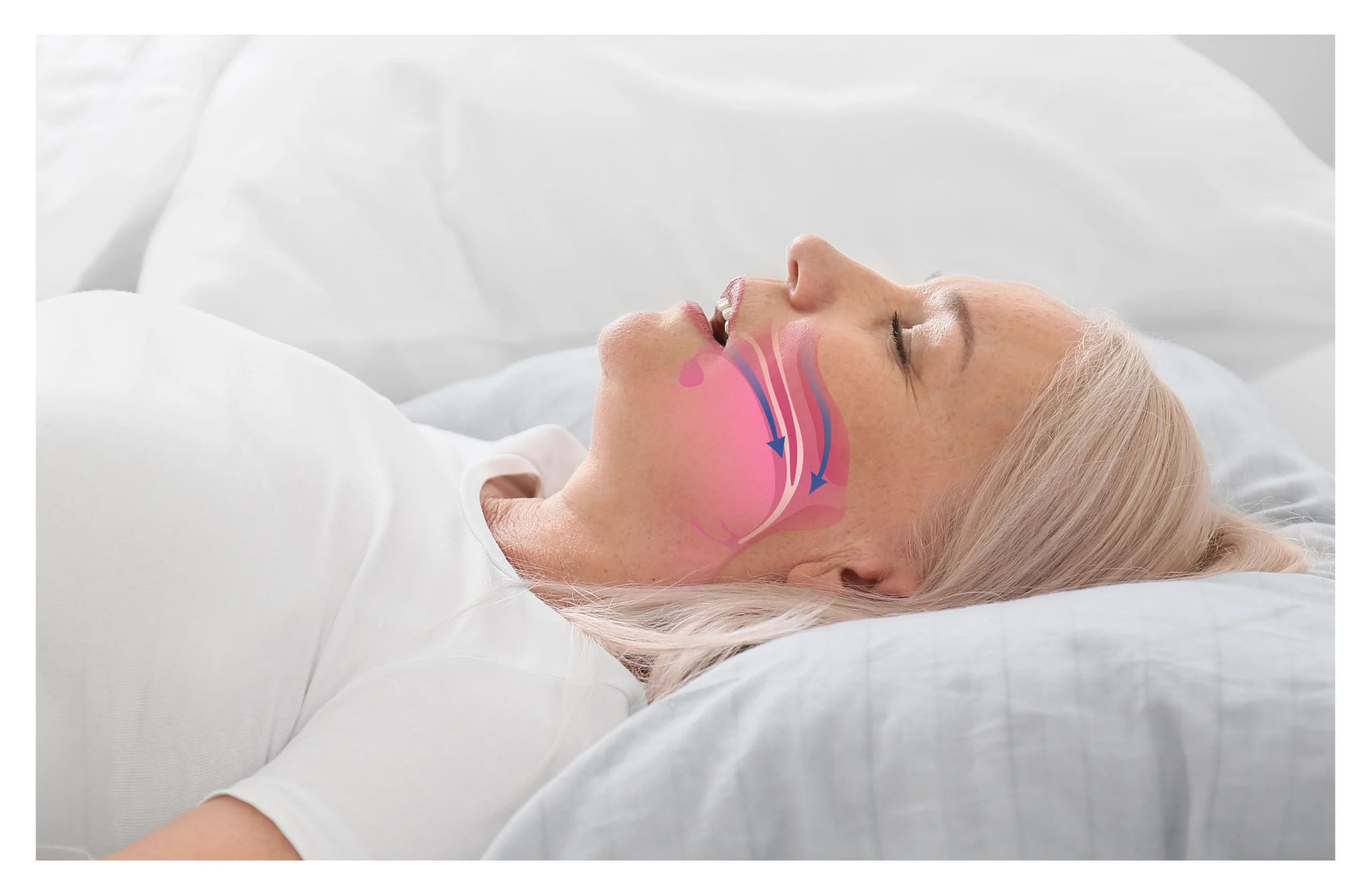Understanding Sleep Apnea
If you experience interruptions in breathing during sleep, you may be suffering from sleep apnea. These interruptions, known as apneas, can occur repeatedly throughout the night, leading to fragmented sleep and inadequate oxygen supply to the body.
Types of Sleep Apnea
Obstructive Sleep Apnea (OSA): The most common type of sleep apnea occurs when the throat muscles intermittently relax and block the airway during sleep. It often leads to loud snoring and pauses in breathing, causing the individual to awaken and resume normal breathing.
Central Sleep Apnea (CSA): Unlike OSA, CSA is a neurological condition where the brain fails to send proper signals to the muscles responsible for controlling breathing during sleep. This results in a lack of breathing effort, leading to frequent episodes of apnea.
Complex Sleep Apnea Syndrome: This type combines both obstructive and central sleep apnea, posing a more complicated situation.
Symptoms and Health Risks
Sleep apnea can manifest in various symptoms, including loud snoring, gasping or choking during sleep, morning headaches, excessive daytime sleepiness, irritability, and difficulty concentrating. If left untreated, sleep apnea can contribute to serious health risks, such as high blood pressure, heart disease, diabetes, and obesity.
Proper diagnosis is crucial for determining the type and severity of sleep apnea. This usually involves undergoing a sleep study at a sleep clinic or using a home sleep apnea test.
The Link Between Sleep Apnea and Weight
Excess weight can have a significant impact on the upper airway. One way excess weight affects sleep apnea is through the accumulation of fat deposits around the upper airway. These fat deposits can narrow the airway, making it more prone to obstruction during sleep. As a result, individuals may experience pauses in breathing, known as apneas, and snoring.
The narrowing of the airway due to fat deposits can lead to increased resistance to airflow, making it harder for air to pass through smoothly. This resistance can cause vibrations in the throat tissues, resulting in the characteristic sound of snoring. The narrowing of the airway can disrupt the normal flow of oxygen, leading to decreased oxygen levels in the blood and subsequent health risks. Moreover, excess weight can also affect respiratory muscle strength and lung function.
AIRLIFT™ Sleep Apnea Treatment
AIRLIFT™ sleep apnea treatment offers a non-invasive and patient-friendly alternative to traditional methods of managing sleep apnea. It involves using custom-made oral appliances designed to fit the individual’s mouth and address the underlying causes of sleep apnea. These appliances help by repositioning the jaw and tongue to help maintain an open and unobstructed airway, reducing the occurrence of apneas and improving breathing patterns.
AIRLIFT™ functions by gently advancing the lower jaw forward. This advancement helps to increase the space at the back of the throat, preventing the collapse of soft tissues and maintaining a clear airway during sleep. By stabilizing the jaw forward, AIRLIFT™ devices effectively minimize airway obstruction, reducing snoring and preventing apneas from occurring.
Some of the distinctive advantages of AIRLIFT™ sleep apnea treatment are the following:
Works instantly
Low to no pain
Long-lasting solution
No recharging
Minimally invasive
The Role of Weight Loss in AIRLIFT™ Treatment
Even a 10% decrease in your body weight can help with sleep apnea symptoms. Weight loss is beneficial in managing sleep apnea because it helps to widen the upper airway.
Weight loss can improve sleep apnea and offer a range of additional health benefits. It may help lower blood pressure, reduce the risk of cardiovascular disease, improve glucose control in individuals with diabetes, and promote overall well-being. By achieving a healthier weight, individuals can experience an improved quality of life and enhance their long-term health outcomes.
It is essential to note that weight loss should be considered as part of a comprehensive treatment plan for sleep apnea. AIRLIFT™ therapy and weight loss are complementary strategies that address sleep apnea and its associated risk factors. Consulting with healthcare professionals, such as sleep specialists or registered dietitians, can provide guidance and support in developing a personalized treatment plan that combines AIRLIFT™ therapy and weight loss interventions.
Can AIRLIFT™ Treatment Lead to Weight Loss?
While AIRLIFT™ is not a weight loss procedure in itself, it can play a significant role in helping patients with obstructive sleep apnea lose weight over time. One of the lesser-known consequences of untreated sleep apnea is reduced energy expenditure due to fragmented sleep and poor oxygenation. When sleep is constantly disrupted, the body’s ability to burn calories efficiently declines, often contributing to gradual weight gain. Additionally, the fatigue caused by sleep apnea can reduce physical activity levels, making it harder for individuals to engage in regular exercise or maintain healthy habits.
By restoring normal breathing patterns and improving sleep quality, AIRLIFT™ treatment helps patients wake up feeling more refreshed and energized. This improved sleep can enhance motivation and physical stamina, making it easier to commit to lifestyle changes that promote weight loss and overall well-being. In the field of clinical sleep medicine, it is well understood that treating the root cause of sleep disruption—such as airway obstruction—can help reverse some of the physiological patterns that contribute to weight gain.
For many obstructive sleep apnea patients, AIRLIFT™ acts as a catalyst for broader health improvements. By addressing nighttime breathing disturbances, patients may find it easier to control their appetite, regulate their metabolism, and engage in the consistent physical activity required to lose weight and maintain it.
Strategies for Weight Loss in Sleep Apnea Management
Regardless of the technique, proper post-surgery care is crucial for a smooth recovery. Applying cold compresses, keeping your head elevated while sleeping, and avoiding strenuous activities can help minimize swelling and discomfort.
Types of Sleep Apnea
A healthy, balanced diet is essential for achieving successful weight loss. Consider the following tips:
- Focus on whole, unprocessed foods such as fruits, vegetables, lean proteins, whole grains, and healthy fats.
- Control portion sizes to ensure calorie intake aligns with weight loss goals.
- Limit the consumption of sugary drinks, processed snacks, and high-fat foods.
- Stay hydrated by drinking plenty of water throughout the day.
Regular Exercise
Incorporating regular physical activity into your routine can help with weight loss and alleviate symptoms of sleep apnea. Consider the following exercise tips:
- Engage in moderate-intensity activities such as brisk walking, cycling, swimming, or aerobic exercises for at least 150 minutes per week.
- Include strength training exercises to build muscle and boost metabolism.
- Find activities that you enjoy to make exercise more enjoyable and sustainable.
- Gradually increase exercise duration and intensity over time.
Weight loss should be approached as a gradual and sustainable process. It is essential to focus on long-term lifestyle changes rather than quick fixes.
To Conclude
With the growing prevalence of sleep apnea, exploring innovative and effective treatment options is crucial. AIRLIFT™ is a compelling approach that combines customized oral appliances to improve breathing and reduce apneas during sleep. By considering the connection between weight loss and sleep apnea treatment, individuals can take a comprehensive approach to managing their condition.
Wake up energized with Texas Sinus & Snoring – book a consultation today.
Frequently Asked Questions (FAQs)
What is the difference between central and obstructive sleep apnea?
The main difference lies in the cause of the breathing disruption. Obstructive sleep apnea occurs when the muscles in the throat relax excessively during sleep, resulting in a physical blockage of the airway. In contrast, central sleep apnea is a neurological condition where the brain fails to send the proper signals to the muscles that control breathing, causing individuals to stop breathing momentarily. Both are forms of sleep-disordered breathing, but they require different treatment approaches. Obstructive sleep apnea is often linked to metabolic issues like insulin resistance. Effective strategies to treat OSA (obstructive sleep apnea) typically involve airway support, lifestyle modifications, or surgical interventions, such as AIRLIFT™.
Can AIRLIFT™ and weight loss reduce the risk of restless legs syndrome?
While restless legs syndrome (RLS) is a separate condition, improving sleep quality with AIRLIFT™ and achieving a healthier body weight can contribute to better, restful sleep. Some research suggests that weight changes may influence the severity of RLS symptoms. By addressing both sleep apnea and excess weight, individuals may reduce the overall disruption in their sleep cycles, which can indirectly help manage RLS symptoms.
What if I gain weight after AIRLIFT™ treatment?
If you gain weight after undergoing AIRLIFT™ treatment, your sleep quality may be affected over time. Excess weight can lead to a recurrence of airway obstruction, especially if you exceed your baseline weight. The more weight you gain, the higher the likelihood that symptoms of sleep apnea could return or worsen. Maintaining a stable, healthy weight after treatment is key to preserving the long-term benefits of AIRLIFT™.
Why is AIRLIFT™ combined with weight loss a great alternative to CPAP treatment?
For many patients, combining AIRLIFT™ with weight loss offers a more comfortable and sustainable option compared to continuous positive airway pressure (CPAP) therapy. While CPAP machines deliver pressurized air to keep the airway open, some individuals find it challenging to use CPAP regularly due to discomfort or inconvenience. AIRLIFT™, especially when paired with a weight loss strategy, provides a minimally invasive, low-maintenance solution that doesn’t rely on CPAP therapy to manage obstructive sleep apnea effectively.
Does sleep apnea treatment improve mental health?
Yes. Treating obstructive sleep apnoea can lead to significant improvements in mood, focus, and overall mental well-being. Chronic poor sleep caused by untreated sleep apnea is associated with depression, anxiety, and cognitive difficulties. In some cases, studies have shown a significant increase in mental clarity and emotional stability after consistent treatment, whether through regular CPAP use, surgery, or other therapeutic interventions like AIRLIFT™.
What health risks can I avoid with AIRLIFT™ and weight loss?
Addressing sleep apnea with AIRLIFT™ and committing to a healthy weight can help reduce your risk of severe health conditions. Untreated sleep apnea has been linked to heart failure and a greater risk of developing high blood pressure, type 2 diabetes, and stroke. By improving sleep quality and reducing airway obstruction, AIRLIFT™ combined with weight loss can significantly lower these health risks and enhance overall long-term wellness.




